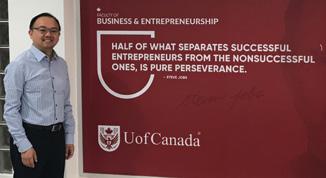
3 minute read
Teach to Learn: My reflective teaching journey at the University of Canada, Egypt
By Dr. Xiao Chen
The University of Canada, Egypt (UCE) is a physical campus in New Cairo, launched in 2018, which is spread over a state-of-theart, fifty-acre smart campus for a consortium of Canadian partner universities. Each university offers different programs and degrees identical to those that they offer in Canada. Students pursuing an undergraduate degree in business are part of the UPEI BBA program in Egypt and, upon completion of the degree requirements, are granted the UPEI BBA degree. Some UPEI professors, including Dr. Xiao Chen, have travelled to Egypt to teach courses at UCE.
IN JUNE 2019, I taught an entry-level organizational behaviour (OB) course at UCE. As a relatively experienced OB instructor, I found this teaching experience to be a novel and unique learning journey, one that instilled and reshaped my philosophy of teaching. Upon reflection, there are four elements relating to the Egyptian culture that became evident during my UCE experience.
Student aspirations. On Day 1, I assigned a question for students to write a short response to: why am I here? Examples of their responses were, “to make myself and parents proud,” “to expand my father’s business,” “to open my own business,” “to help make an impact on someone’s life and the world,” etc. Genuine, insightful, and dynamic, these responses reflected that the students had a variety of reasons for pursuing a business degree at UCE. They strive for personal and family growth beyond succeeding in future business endeavours. Emotional intelligence and culture. In one lecture, we discussed how workplace events may trigger workers’ emotions, which in turn affect work-related outcomes such as job performance and satisfaction. At one point in the lecture, students were being disruptive (talking, or walking out of the classroom without my consent) and it made me jittery and distracted. I decided to take a minute to pause the lecture and compose myself. When I started again, most students had quieted down, and I pointed out the importance of considering individual characteristics such as emotional intelligence (i.e., one’s ability to understand and manage one’s own and other’s feelings and emotions) when assessing emotional regulation at work. I encouraged the students to reflect upon the occurrence so that they would better comprehend the relevance of human emotions to organizations, using myself as well as themselves as examples. Upon reflection afterward, I realized that cultural norms may have had a lot to do with
22 ENGAGE MAGAZINE | FALL 2019 Dr. Xiao Chen at the UCE
the way students were behaving, as well as my reactions to that behaviour. The importance of the relational self. As a relatively stable set of psychological characteristics, personality is a critical predictor of an individual’s behaviour. In traditional Western-rooted theories of personality, however, the interdependent domains of personality have been rarely addressed. When I teach about personality, I typically include a few Chinese indigenous personality constructs that are interpersonal. One of these constructs is ren qing (i.e., the Chinese norm of reciprocity). For example, I ask students to rate their agreement with a statement like, “I find it very hard to say ‘no’ when others make requests or give me assignments.” I found the insights regarding the relational aspect of personality resonated with the UCE students more than with Canadian students and they believed the perspective of “relational self” essential and critical to their own lives, both social and professional. Encouraging team cohesiveness and performance-related norms. In theory, team effectiveness is a function of team cohesiveness (i.e., the extent to which a group is attractive to its members) and performance-related norms (i.e., acceptable standards of how hard to work). In general, collectivistic cultures have a strong predisposition to work together as a group (i.e., high cohesiveness), whereas in individualistic cultures, team cohesiveness is typically harder to achieve. I found the UCE teams highly cohesive. The key challenge, however, was to cultivate high performance-related norms. In my opinion, there might exist some cultural tactics to instill higher instrumental cohesiveness (i.e., give every team member a vital ‘piece of the action’ in a project) so that performance-related norms can be enhanced. That is, performance-related norms may be cultivated by some persuasive means that are aligned with local cultural norms. Upon reflection as a Chinese (Canadian) professor teaching OB in English (his second language) in Egypt, I wonder, whose OB was I teaching? Ours? Yours? Theirs? The question leaves much room for reflection, research and discovery. I appreciate and embrace my UCE encounter as a truly teach-tolearn opportunity, and am grateful for the insights and inspiration that came from the experience.

